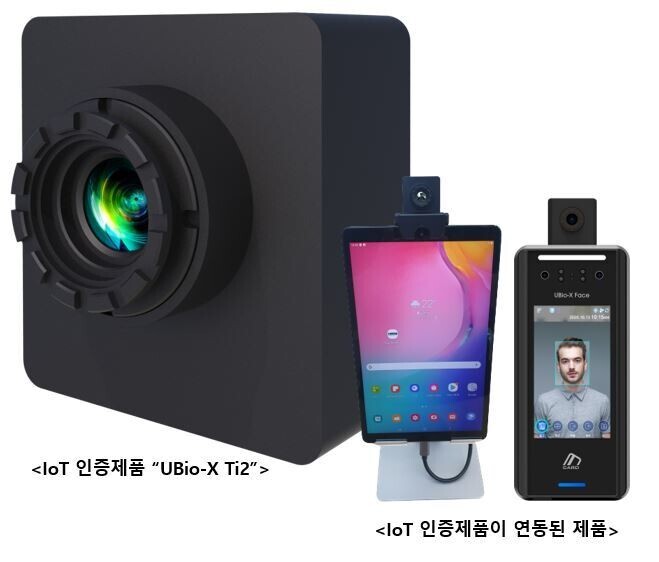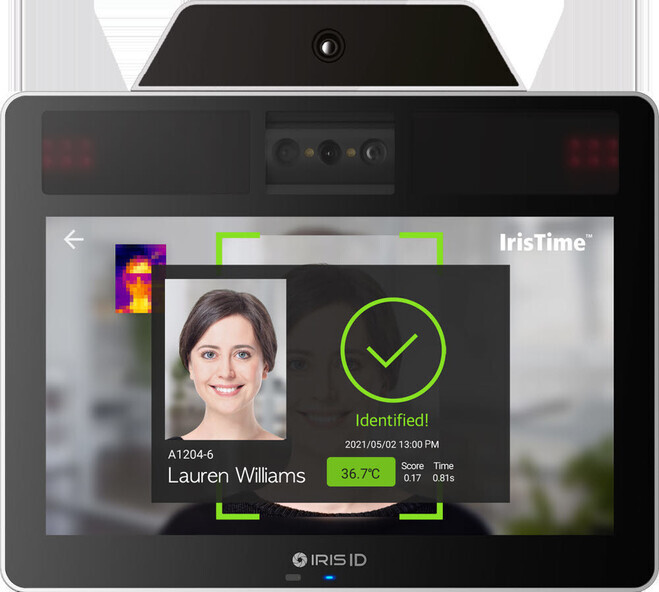hankyoreh
Links to other country sites 다른 나라 사이트 링크
S. Korea develops thermal cameras that eliminate data leak concerns

South Korea has developed its first camera-based body temperature measurement devices with certified information protection systems in place to eliminate risks of improper storage and leaking of subjects’ facial information.
The South Korean government asked two small businesses to develop the devices in response to growing concerns about personal information infringements after revelations that the temperature reading devices currently used for COVID-19 prevention at the entrances of facilities have features that allow them to improperly store and transmit video showing subjects’ faces.
The government is recommending that government and public institutions use certified devices whenever possible.

The Ministry of Science and ICT (MSIT) announced Wednesday that it had granted information security certification to two new body temperature measuring devices: the UBio-X Ti 2 developed by Union Community and the iT100-THM developed by Iris ID.
The certification is the government’s way of confirming that devices connected to information and communication networks meet standards of security in accordance with Article 48-6 of the Act on Promotion of Information and Communications Network Utilization and Information Protection.
Regarding the devices’ security, the MSIT noted that they “do not have any original facial image storage or external transmission features in the first place,” which it concluded had “eliminated the risk of personal information leaks at the source.”
Hong Jin-bae, director general of the ministry’s Cyber Security and Network Policy Bureau, told the Hankyoreh, “Information security certification was introduced for thermal imaging measurement devices in order to ensure information and communication network stability and information reliability by having security features present in devices from the manufacturing stage.”
“To eliminate concerns about personal information being leaked through body temperature measurement devices, we plan to recommend that government and public institutions use the certified products,” he added.
The government’s decision to grant information security certification for thermal imaging cameras was prompted in part by an exclusive Hankyoreh report in May on features included in the cameras currently used at the entrances of public institutions and enterprises and multipurpose facilities, which allow subjects’ facial data to be improperly stored and transmitted overseas.
After the report, the MSIT and Personal Information Protection Commission conducted on-site inspections and product analyses, determining that many of the thermal imaging cameras sold in South Korea had been manufactured in China and were being used with their transmission features still active.
Evidence that images captured by the cameras had been transmitted to external locations was found in some of the devices.
“During our analysis, we asked South Korean companies why all of these devices were made in China, and they told us that they hadn’t worked on developing body temperature measurement devices for disease control purposes because they expected the COVID-19 pandemic to end in the near future,” Hong explained.
“We concluded that we couldn’t just sit around while people were using thermal imaging measurement devices that posed a risk of leaking personal information, so we asked a few small businesses to manufacture devices that did not have those security vulnerabilities, and we had certified them for information security,” he said.
He went on to announce plans to “eliminate concerns about personal information leaks by expanding the information security certification to automated devices in the home that have Internet of Things functionality, including door locks, video phones and smart refrigerators.”
By Kim Jae-seob, senior staff writer
Please direct questions or comments to [english@hani.co.kr]

Editorial・opinion
![[Column] Season 2 of special prosecutor probe may be coming to Korea soon [Column] Season 2 of special prosecutor probe may be coming to Korea soon](https://flexible.img.hani.co.kr/flexible/normal/500/300/imgdb/original/2024/0426/3317141030699447.jpg) [Column] Season 2 of special prosecutor probe may be coming to Korea soon
[Column] Season 2 of special prosecutor probe may be coming to Korea soon![[Column] Park Geun-hye déjà vu in Yoon Suk-yeol [Column] Park Geun-hye déjà vu in Yoon Suk-yeol](https://flexible.img.hani.co.kr/flexible/normal/500/300/imgdb/original/2024/0424/651713945113788.jpg) [Column] Park Geun-hye déjà vu in Yoon Suk-yeol
[Column] Park Geun-hye déjà vu in Yoon Suk-yeol- [Editorial] New weight of N. Korea’s nuclear threats makes dialogue all the more urgent
- [Guest essay] The real reason Korea’s new right wants to dub Rhee a founding father
- [Column] ‘Choson’: Is it time we start referring to N. Korea in its own terms?
- [Editorial] Japan’s rewriting of history with Korea has gone too far
- [Column] The president’s questionable capacity for dialogue
- [Column] Are chaebol firms just pizza pies for families to divvy up as they please?
- [Column] Has Korea, too, crossed the Rubicon on China?
- [Correspondent’s column] In Japan’s alliance with US, echoes of its past alliances with UK
Most viewed articles
- 1Is Japan about to snatch control of Line messenger from Korea’s Naver?
- 2[News analysis] Using lure of fame, K-entertainment agency bigwigs sexually prey on young trainees
- 3[Column] Park Geun-hye déjà vu in Yoon Suk-yeol
- 4Will NewJeans end up collateral damage in internal feud at K-pop juggernaut Hybe?
- 5‘We must say no’: Seoul defense chief on Korean, USFK involvement in hypothetical Taiwan crisis
- 6[Column] The clock is ticking for Korea’s first lady
- 7[Column] Season 2 of special prosecutor probe may be coming to Korea soon
- 8Korea’s 1.3% growth in Q1 signals ‘textbook’ return to growth, says government
- 9Division commander ordered troops to enter raging flood waters before Marine died, survivor says
- 10Report reveals toxic pollution at numerous USFK bases